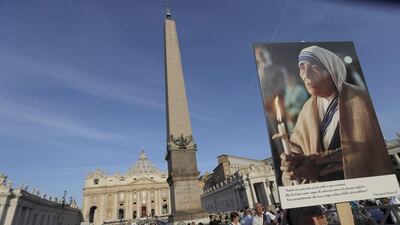NEW DELHI // Mother Teresa, the nun who worked for decades with the poor and the sick in India, was canonised by the Catholic church on Sunday in a ceremony at St Peter’s Square in Vatican City.
“After due deliberation and frequent prayer for divine assistance, we declare and define Blessed Teresa of Calcutta to be a saint,” Pope Francis said during the ceremony, “and we enrol her among the saints, decreeing that she is to be venerated as such by the whole church.
“Mother Teresa loved to say, ‘Perhaps I don’t speak their language, but I can smile,’” the pope added. “Let us carry her smile in our hearts and give it to those whom we meet along our journey, especially those who suffer.”
India’s external affairs minister, Sushma Swaraj, led an official delegation to the ceremony. The Indian government has also released a postage stamp commemorating the canonisation.
“Mother Teresa provided dignity and respect to those who had been defeated by life,” the Indian president Pranab Mukherjee said in a statement. “She was a messiah of the poor and a pillar of support for the weak and suffering.”
Tens of thousands of pilgrims thronged St Peter’s Square for the canonisation, many of them arriving before dawn to secure a spot.
In Kolkata, Mother Teresa’s adopted home and the stage for her charitable work, thousands more followed the ceremony on television. The government of West Bengal set up giant screens across the state capital, and hundreds of people watched it at the headquarters of the Missionaries of Charity, the order Mother Teresa founded in 1950.
Through spells of rain over the weekend, visitors streamed into Mother House, the building where Mother Teresa lived, to light incense sticks and pray. A large poster of her was draped over the facade of the cornflower-blue building.
Mother Teresa memorabilia – key chains, coffee mugs, lockets, postcards, rosaries and miniature statues – were on sale at shops across the Kolkata.
Mother Teresa, who took citizenship of her adopted country in 1951, becomes the second Indian woman to be declared a saint. The first, Alphonsa Muttathupadathu of Kerala, was canonised in 2008.
Born in what is now Macedonia in 1910, Mother Teresa came to India in 1929 and became a nun in 1931. In 1946 she moved to Kolkata to help the poor in that city, where she remained until her death in 1997.
The Missionaries of Charity, which now has more than 5,000 nuns around the world, continues to run schools, soup kitchens, hospitals and homes for orphans and the poor – people who, as Mother Teresa said, “feel unwanted, unloved, uncared for throughout society, people that have become a burden to the society and are shunned by everyone”.
For her work, Mother Teresa won the Nobel Peace Prize in 1979.
Among the thousands of children cared for by the Missionaries of Charity was Gautam Lewis, whom Mother Teresa rescued when he was a two-year-old orphan stricken with polio.
“Mother Teresa used to carry me to church every Sunday, and she personally supervised my treatment when I underwent surgeries and rehabilitation to get rid of polio,” said Mr Lewis, 39, now a pilot living in London, who travelled to Kolkata to celebrate Mother Teresa’s life. “I remember feeling very safe and secure in her presence.”
But the "saint of the gutters", as Mother Teresa was often called, also has critics and sceptics, and controversy has surrounded her work. In an article published in the Economic Times newspaper on Saturday, Aroup Chatterjee, a British doctor who was born in Kolkata, called her "the ultimate politician who worked on behalf of the Vatican".
Dr Chatterjee, who wrote a book titled Mother Teresa: The Untold Story in 2003, has criticised her mission for converting the needy in her care to Christianity, the hygiene and quality of care in her hospitals, and her acceptance of money from dictators and swindlers.
Several critics – including the writer Christopher Hitchens, who died in 2011 – have also accused the Missionaries of Charity of collecting and using funds in an opaque manner. Although donations to the order are suspected to be vast, the Missionaries of Charity does not publish its accounts.
“What business is it of anybody’s what we do with the money?” said Sunita Kumar, a spokesperson for the order. “Why should we expose our own accounts to others? Mother Teresa’s focus was not to build five-star hospitals, it was to provide for the poor.”
ssubramanian@thenational.ae
* With reporting from Agence France-Presse

